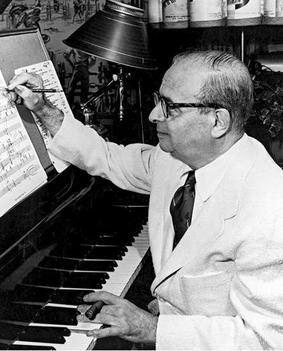by Jarrett Hoffman

•Baritone Edward Vogel and pianist Alex Lenhart at Church of the Covenant at noon
•News: Re:Sound tickets on sale, Guitar Society students in podcast music, the Black Orchestral Network addresses American orchestras, and Raven Chacon (pictured) wins the Pulitzer Prize
•Almanac: Max Steiner and King Kong
HAPPENING TODAY:
The Church of the Covenant’s Tuesday Noon series features baritone Edward Vogel and pianist Alex Lenhart in a program that includes Alan Hovhaness’s Prayer of St. Gregory, Gerald Finzi’s Let Us Garlands Bring, Moses Hogan’s Deep River, and selections from Aaron Copland’s Old American Songs. Catch the free concert in person or online.
NEWS BRIEFS:
Festival passes and individual tickets are available for next month’s Re:Sound Festival, which takes place June 9-12. Click here to survey the lineup and here for tickets.
Last summer, five students and two educators at the Cleveland Classical Guitar Society came together to compose and record a piece for guitar ensemble — a piece that now serves as the theme music for Season 2 of the podcast The Asterisk*, beginning with the episode released on April 28. A production of the Anisfield-Wolf Book Awards — the only juried American book prize dedicated to texts addressing racism and diversity — the podcast is centered around AWBA-winning authors and texts.
Speaking of awards, yesterday composer Raven Chacon took home the Pulitzer Prize for Music for his Voiceless Mass, written for organ and ensemble. “It is the latest in a series of works by Chacon exploring the injustices suffered by Indigenous people,” writes Javier C. Hernández, who interviewed Chacon for The New York Times in the hours after the announcement. Read the article here.
As part of the launch of the Black Orchestral Network last week, the organization has introduced a call to action around the pursuit of equity and inclusivity in the orchestral field. Click here to read the open letter “Dear American Orchestras,” directed not only at ensembles but also funders, unions, and members of the orchestral community.
TODAY’S ALMANAC:
Last year’s edition of the Almanac centered around English tenor Richard Lewis and American composer Milton Babbitt. This time, we turn to “the father of film music” and a revolutionary score.

Steiner went on to write over 300 film scores, including The Informer, Little Women, Casablanca, and Gone with the Wind, but our focus today is on 1933’s King Kong. The first American “talkie” to include a feature-length score, and one of the first to feature a 46-piece orchestra, Kong was also revolutionary for Steiner’s use of leitmotif, a technique that would become standard in the language of film music.
And this music might easily have never been written. The production company, RKO Radio Pictures, sought to save money by having Steiner reuse music from other films rather than write anything new. Not pleased with that decision, one of the film’s co-directors, Merian C. Cooper, reached into his own pocket (later to be reimbursed by the studio), paying Steiner fifty grand to do the real thing.
As a side note, not only did the film introduce the public to the character of King Kong, but it also provided an early cinematic sight of the Empire State Building, which had only opened two years earlier. Watch that iconic monster climb that iconic skyscraper in this iconic clip.
By the way, when is an orchestra going to dust off this score for a live movie screening? It might not be the most important issue in programming, but listen to the music for the opening titles here and tell me you don’t want some of that in your life.



